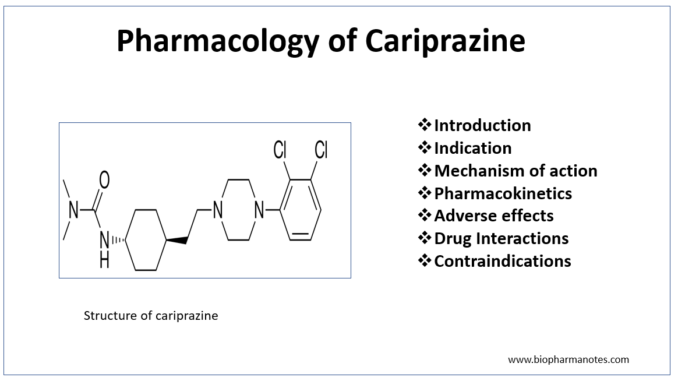
- Cariprazine is recently approved atypical (second generation) anti-psychotic drug. It was approved by FDA in 2015.
- Chemically, it is a piperazine derivative. It is pharmacodynamically and pharmacokinetically different from other oral antipsychotics. It is 3rd dopamine receptor partial agonist after aripiprazole and brexpiprazole.
Indications of cariprazine
- For treating schizophrenia.
- Acute treatment of manic or mixed episode and major depression associated with bipolar I disorder.
- Some off-label uses are major depressive disorder. Clinical trials are going on regarding its use in patients with acute bipolar I depression and as adjunctive treatment to antidepressant therapy in patients with major depressive disorder.
Mechanism of action of cariprazine
- It’s mechanism of action is different compared to other antipsychotics. It is partial agonist of dopamine D2 and D3 receptor. It has high affinity for D3 receptor and it’s effect on D2 receptor is similar to that of aripiprazole.
- As per dopamine theory of schizophrenia, overactivity of dopamine in mesolimbic pathway produces positive effects like hallucination, delusion etc. Negative (lack of interest, lack of social interaction) and cognitive (thought disorder, bizarre behavior) symptoms are caused by hypofunction of dopamine in mesocortical pathway. It reduces dopaminergic activity in mesolimbic pathway by partial D2 agonism and reduce positive symptoms. Its ability to alleviate negative and cognitive symptoms is believed to be its ability to increase dopaminergic activity from subnormal to normal in mesocortical pathway.
- The effect of D3 receptor blockade is not clear till now. However, preclinical study suggest that it may have pro-cognitive, antidepressant and helpful in negative symptoms and stimulant abuse.
- It is a partial agonist of serotonin 5HT1A receptor and antagonist at 5HT2B and 5HT2A receptors. It also binds to few other receptors.

Figure- Receptor profile and binding affinities of cariprazine (Source- Campbell et al, 2017)
Pharmacokinetics of cariprazine
- It is administered though oral route once in a day.
- Metabolism occur in liver by CYP3A4 enzyme system and to less extent by CYP2D6. The two active metabolites are desmethyl- cariprazine (DCAR) and didesmethyl- cariprazine (DDCAR). Didesmethyl- cariprazine has half-life of 1-3 weeks. Cariprazine and DCAR is responsible for early efficacy and tolerability and DDCAR is responsible for later efficacy and tolerability.
- Excretion takes place mostly though urine.
Adverse effects
- Adverse effects may appear several weeks after starting of treatment due to accumulation of drug and metabolites. Some common side effects include extrapyramidal symptoms (acute dystonia, tardive dyskinesia etc), weight gain, headache, insomnia. It may also cause nausea, vomiting, agitation, anxiety, hypertension, tachycardia etc.
- It doesn’t increase prolactin level (hyperprolactinemia) so no prolactin related side effects like amenorrhea, gynecomastia etc.
- Black box warning for increasing mortality in elder patients with dementia related psychosis and hence not approved for treating patients with dementia related psychosis. Antidepressant increases suicidal thoughts in pediatric patients. Safety and efficacy of cariprazine in pediatric patients has not been established.
Drug Interactions
- It may enhance CNS depressant effect of alcohol, thalidomide and alizapride.
- Concurrent administration with drugs like carbamazepine, efavirenz, phenytoin, rifampin, nevirapine, mititane etc should be avoided.
Contraindications
In patients hypersensitive to cariprazine or any other substance of formulation.
Reference
- https://go.drugbank.com/drugs/DB06016
- https://reference.medscape.com/drug/vraylar-cariprazine-999874#5
- https://www.drugs.com/ppa/cariprazine.html#interactions
- Stahl SM. Mechanism of action of cariprazine. CNS spectrums. 2016; 21(2): 123-127.
- Citrome L. Cariprazine for the Treatment of Schizophrenia: A Review of this Dopamine D3-Preferring D3/D2 Receptor Partial Agonist. Clinical schizophrenia and related psychoses. 2016; 109-119.
- Campbell RH, Diduch M, Gardner KN, Thomas C. Review of cariprazine in management of psychiatric illness. Mental Health Clinician. 2017: 7(5): 221–229.